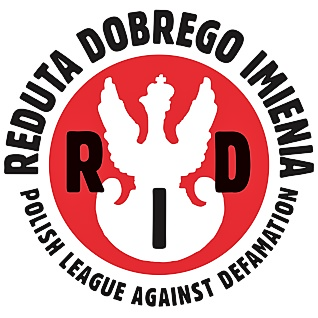Today at 13.30 in the District Court in Warsaw a trial was held against Barbara Engelking and Jan Grabowski, co-authors of the controversial book „Dalej jest noc,” who accused Edward Malinowski of having reported on and therefore was responsible for the extermination of the Jews living in his village during World War II. The legal process began as a resut of Filomena Leszczyńska, niece of Edward Malinowski accusing the authors of slander.
During the hearing, the defendants were present in the court room, as well as television and the press, including journalist Wojciech Czuchnowski. The representatives of the defendants, Jan Grabowski and Barbara Engelking objected to the President of “ Reduta’ Maciej Świrski being heard as a witness. However, the court admitted evidence from the witness’s testimony. The President of “Reduta” spoke of why “Reduta Dbrego Imienia” became interested in this matter and how he met Mrs. Filomena Leszczynska. Maciej Świrski also presented the extent of harm suffered by the entire Malinowski family, after the book was published. In addition, this extraordinary family’s history was presented, the Malinowscy, during the war, helped Jews and Home Army soldiers, after the war – the cursed soldiers, for which this, its members (including a 15-year-old boy Tadzio) were arrested and imprisoned in Stalinist jails.
After these testimonies, there was a pause in the hearing due to the plaintiff’s presentation of a new evidence in the case – i.e. a review by Dr. Piotr Gontarczyk of the book entitled ‘Dalej jest noc”. According to the defendant’s representative, the article by dr. Piotr Gontarczyk was not known to them and they therefore asked for an adjournment. The court adjourned the trial indefinitely due to, the necessity of questioning Filomena Leszczyńska in her home.
Everything indicates to the fact that, J. Grabowski and B. Engelking made methodological errors and mistook two different people with the same name and surname and merged their lives into one biography.
Edward Malinowski, the uncle of Filomena Leszczyńska, was presented in excerpts of the book „Dalej jest noc” as „an accomplice to the deaths of several dozen Jews, who were hiding in the woods and their whereabouts disclosed to the Germans”. In reality, he helped the Jews .It seems that, Jan Grabowski and Barbara Engelking, when accusing Malinowski, had not – carried out a thorough analysis of the documents – something very obvious for every historian. If they had done so, the lives of several (or at least two) people with the surname Malinowski would not have been combined.
During the 1950 trial , allegations of „the complicity of Edward Malinowski” in the murder of Jews were refuted, and the survivors – Jews whom Malinowski hid – testified in favor of the accused. As for the accounts of Maria Wiltgren, which the defendants presented, as evidence of Edward Malinowski’s guilt, it should be emphasized that she could only testify to what she heard from other. At the time of the information being given to the Germans about the Jews hiding in the forest near Malinowo, she was not in this village. She only came there, a year later. What’s more, she gave her testimony, which Barbara Engelking and Jan Grabowski used, in 1996, which is over 50 years after the events in Malinów and reported only, what she heard, a year after the actual events. According to Filomena Leszczyńsk’s representatives, the defendants did not properly analyze he documents relating to Maria Wiltgren or her testimonies, and they did not sufficiently substantiate, their thesis that the accusations of this woman relate to the Edward Malinowski described in their book.
Filomena Leszczyńska, with the support of “Reduta”, demands the removal of the effects of a breach of personal rights by – public statements, reprints in accordance to the truthful testimonies of Maria Wiltgren (known then by the name of Wiśniewska) and compensation in the amount of PLN 100,000. “Reduta Dobrego Imienia” bears the costs the costs to do with this case (attorney’s fees and court costs, administrative fees, the costs of expert opinions and historians).

